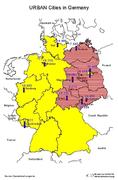inu central places periodic news urbanism cities surveys & analyses creativity citizenship brownfields smart city social capital globalization urban development call for articles inu study day ecology landscapes città storica call for papers summer schools energy local plans scenarios governance scali ferroviari
A Successful Approach to Urban Upgrading
Results of the Evaluation of the Community Initiative URBAN in Eastern Germany
by Kathleen Toepel
The European Union's Community Initiative URBAN aims to improve the critical social and economic situation of many city boroughs, and particularly to improve the quality of life for the population of these boroughs. It supports integrated measures in selected cities for economic development and social integration, for rehabilitating infrastructure, and for environmental protection. The projects are to act as models for other cities, and particularly innovative projects that form an integrated long-term strategy for urban development receive priority. In this respect, the programmes break new ground in urban renewal policy.
The German Institute for Economic Research has carried out an evaluation of all URBAN programmes in Eastern Germany. The integrated approach, with the bundling of means and measures in problem boroughs, was successful, and is particularly well suited to solving complex problems. Based on the evaluation results, the continuation and mainstreaming of the integrated URBAN approach to urban renewal is strongly recommended. The core items of URBAN should be adopted in any new programme.
There are several options for continuing with the integrated URBAN approach to urban renewal. First, the Community Initiative URBAN will be implemented after 2000. Second, the urban dimension will be mainstreamed in the form of integrated urban development measures in new regular Structural Funds programmes. Third, there are considerations to add to the German Urban Renewal Programme, a new programme essentially reflecting the integrated URBAN approach. After presenting the main results of the evaluation of the East German URBAN programmes, this paper analyses the way the approach was mainstreamed in Germany.




Planum
The Journal of Urbanism
ISSN 1723-0993
owned by
Istituto Nazionale di Urbanistica
published by
Planum Association
ISSN 1723-0993 | Registered at Court of Rome 4/12/2001, num. 514/2001
Web site realized by ChannelWeb & Planum Association | Powered by BEdita 3

